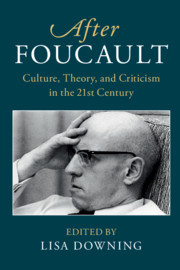Book contents
5 - Foucault and Literary Theory
from Part II - Coming After Foucault
Published online by Cambridge University Press: 30 May 2018
Summary
Michel Foucault began his career in an intellectual world for which literature and literary theory mattered a great deal. So it is understandable that, early in his career, literature, or, at any rate, a particular conception of literature, was a touchstone for him. More that that: it was a centre around which his work as a whole turned. That remained the case up until about 1968, when the student/worker ‘revolution’ transformed the political and cultural order in France. Although Foucault was not himself directly involved in these events, in their wake for a short period, he moved towards a kind of Maoism. In 1969, he published ‘What Is an Author?’, an essay which subjected the literary field to a distinctly post-literary inspection. Here he was interested not in literature as such but in the ‘author function’, by which he meant the terms on which certain texts and discourses came to have authors while others did not, and in the features and structures which enabled these texts to be authored. The essay implied that anonymity, and the radical equality it enabled, was a condition for a less elitist literary world.
But during his high literary period, from about 1963 to 1969, he published a series of more insistently literary essays and reviews, as well as a monograph on Raymond Roussel (first as simply Raymond Roussel in 1963 and translated into English as Death and the Labyrinth: The World of Raymond Roussel in 1986). At this point in his career, his interest in literature spills across into his non-literary works too. Most importantly, it underpins his breakthrough 1961 monograph on madness, Folie et déraison: Histoire de la folie à l’âge classique (first translated into English as Madness and Civilization: A History of Insanity in the Age of Reason in 1965), just as it does in his famous revisioning of intellectual history, Les mots et les choses (1967) (translated into English as The Order of Things in 1970).
In The Order of Things, for instance, the works of avant-garde or outsider writers such as the Marquis de Sade, Stephan Mallarmé, Raymond Roussel, Michel Leiris, and Francis Ponge reveal experiences and impulsions that have been occluded by both the ‘classical’ and the ‘modern’ epistemes (or regimes of knowledge) that the book describes.
- Type
- Chapter
- Information
- After FoucaultCulture, Theory, and Criticism in the 21st Century, pp. 79 - 92Publisher: Cambridge University PressPrint publication year: 2018
- 1
- Cited by

